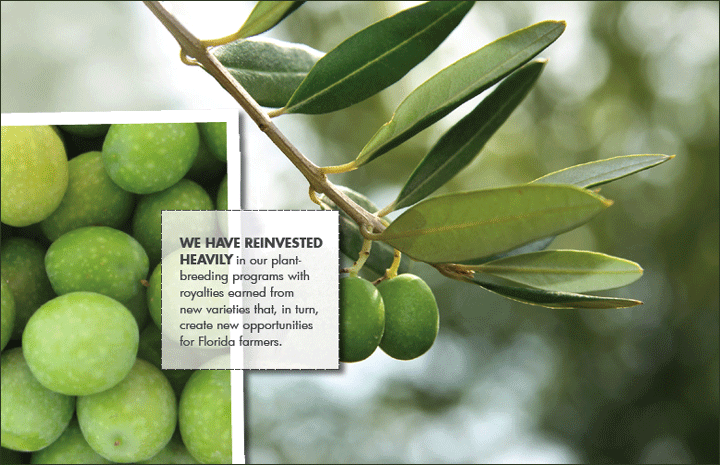| Plant breeding and other research that helps small farms |
FLORIDA – THE OLIVE STATE? While the citrus industry is far and away the Sunshine State’s agriculture ambassador, olives, as well as blueberries, pomegranates, grapes, lettuce, clams, peaches, and more, represent new, alternative crops that are thriving on Florida farms.
Many of these alternative crops have been developed by University of Florida Institute of Food and Agricultural Sciences (UF/IFAS) scientists and shared with agricultural producers by our UF/IFAS Extension agents. Florida’s unique climate and growing conditions provide an abundance of opportunities for producers to grow and sell many new, specialty products and multiple varieties of existing crops. Since 1892, UF/IFAS breeders have developed 862 plant varieties – cultivars that resist disease and drought, fruit that tastes sweeter, ornamentals that live longer and cost less to maintain.
UF/IFAS scientists, including Paul Lyrene and Jim Olmstead, developed blueberry varieties that thrive in Florida’s hot weather, building new product lines that have helped bolster its blueberry crop into an economic powerhouse, one that generates nearly $70 million in sales per year. National Academy of Sciences fellow Harry Klee is working to improve the flavor quality of many fruit and vegetable varieties, most notably, tomatoes. And while I can’t divulge details just yet, I can tell you we have a very promising — and delicious — strawberry variety in the works.
Currently, there are 27 IFAS plant breeders who work in four academic departments at the main UF campus in Gainesville and six of our UF/IFAS Research and Education Centers across the state. We have reinvested heavily in our plant-breeding programs with royalties earned from new varieties that, in turn, create new opportunities for Florida farmers.
Throughout IFAS, we work hard to bring all of this knowledge directly to farmers. Our UF/IFAS Extension agents aim every day to give farmers the latest science-based information and the tools to successfully build and expand their operations. Nearly 50 faculty and staff make up the Small Farms and Alternative Enterprises focus team in UF/IFAS Extension. Small farms, according to the U.S. Department of Agriculture, those with less than $250,000 in annual sales, represent more than 90 percent of all Florida farms. Despite their label, they pack a hefty economic punch, generating about 15 percent of all the state’s farm product sales. Small farmers and allied organizations have identified critical issues facing such farms, including access to profitable markets, business-skills development, accessible technical information, and alternative crops and enterprises. Whether it is about getting started, evaluating a possible crop, finding a market or attending a regional workshop, farmers interested in alternative enterprises can find it all at one website: smallfarms.ifas.ufl.edu.
In addition to creating many training programs and educational materials for our state’s small farmers, IFAS Extension can help connect farmers through MarketMaker, a free, easy marketing program that links producers with consumers using market-analysis tools. It is a national partnership of land-grant institutions and state agriculture departments to help farmers and agriculture-oriented operations. By registering with MarketMaker, you’ll help potential customers find you and grow your business.
Taken together, UF/IFAS Research, Extension and the College of Agricultural and Life Science is your partner in envisioning your success and making a prosperous tomorrow happen – today.
Resources:
http://www.crec.ifas.ufl.edu/extension/olives/
http://smallfarms.ifas.ufl.edu/
http://fl.marketmaker.uiuc.edu/
CREDIT
article by JACK PAYNE
Jack Payne is the senior vice president for Agriculture and Natural Resources with the University of Florida’s Institute of Food and Agricultural Sciences (UF/IFAS).

